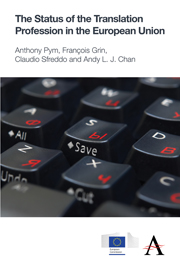Book contents
- Frontmatter
- Contents
- GENERAL INTRODUCTION
- 1 METHODOLOGICAL ISSUES
- 2 RESULTS
- 3 CASE STUDIES
- 4 SOCIOLOGICAL MODELLING
- 5 ECONOMIC MODELLING
- 6 POLICY OPTIONS FOR ENHANCED SIGNALLING
- 7 RECOMMENDATIONS
- APPENDIX A Translator Associations: Years of Foundation and Numbers of Members
- APPENDIX B Why There Are About 333,000 Professional Translators and Interpreters in the World
- APPENDIX C Online Translator—Client Contact Services: New Modes of Signalling Status
- APPENDIX D Types and Use of Economic Perspectives on Translation
- APPENDIX E Equilibrium on the Translation Market
- NOTES
- REFERENCES
- ACKNOWLEDGEMENTS
- NOTES ON THE RESEARCH TEAM
1 - METHODOLOGICAL ISSUES
Published online by Cambridge University Press: 05 April 2014
- Frontmatter
- Contents
- GENERAL INTRODUCTION
- 1 METHODOLOGICAL ISSUES
- 2 RESULTS
- 3 CASE STUDIES
- 4 SOCIOLOGICAL MODELLING
- 5 ECONOMIC MODELLING
- 6 POLICY OPTIONS FOR ENHANCED SIGNALLING
- 7 RECOMMENDATIONS
- APPENDIX A Translator Associations: Years of Foundation and Numbers of Members
- APPENDIX B Why There Are About 333,000 Professional Translators and Interpreters in the World
- APPENDIX C Online Translator—Client Contact Services: New Modes of Signalling Status
- APPENDIX D Types and Use of Economic Perspectives on Translation
- APPENDIX E Equilibrium on the Translation Market
- NOTES
- REFERENCES
- ACKNOWLEDGEMENTS
- NOTES ON THE RESEARCH TEAM
Summary
What Do We Mean by Status?
The signalling of qualifications can be seen in the following recent developments, cited here as mere examples:
— The Global Translation Institute is managed by Adriana Tassini from an office in Portland, Oregon (although it seems not to be registered with the Portland Revenue Bureau, which does not list it at the address given). It sponsors a Certified Translation Professional (CTP) Designation Program, managed by Adriana Tassini with a telephone number in Massachusetts. It links to free information on the translation industry and how to become a translator, all of which comprises some 40 short online articles by Adriana Tassini. Adriana Tassini describes herself as a “Harvard University Alumni Member with a background in international relations and translation work in São Paulo, Brazil and Boston, Massachusetts (USA)”. She names no completed degrees. Her declared training team comprises 12 people, none of them with any formal training in translation. To become a Certified Translation Professional, you pay US$227 per language pair, study the learning materials (none of which is language-specific) and sit the online exam. It is not clear to what extent the exam tests language skills, but the programme offers certification in 22 language pairs, of which the training faculty are presented as being experts in five.
— The International Association of Professional Translators and Interpreters was founded in Buenos Aires in 2009. It accepts members who 1) have a degree or diploma from “a recognized institution”, or 2) have at least four years’ experience as a translator or interpreter. No list of “recognized institutions” is offered. You can become a member for US$60 a year, which entitles you to use the association’s logo and an email address with the association’s domain, and benefit from discounts on industry publications, and inclusion in the association’s online directory. The association lists its “Honorary members” as including Noam Chomsky, who has no professional training in translation but nevertheless retains considerable academic standing.
- Type
- Chapter
- Information
- Publisher: Anthem PressPrint publication year: 2013

